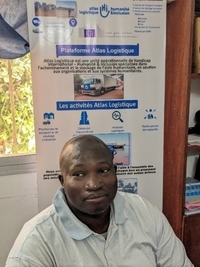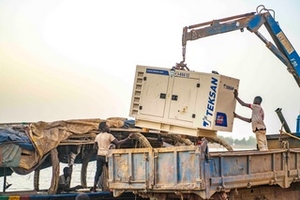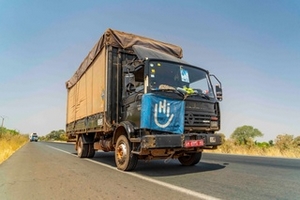share

Transportation of humanitarian inputs by river operation to Gao, Mali, in 2023. | © T. N’Daou / HI
With the support of the European Union, HI provides other NGOs with a road and river transport service to deliver aid to populations in vulnerable situations.
In a concerning security context, HI/Atlas aims to support local and international NGOs operating in unstable areas of the country. In these areas, there is a significant deterioration in access conditions to beneficiaries and a concentration of humanitarian aid needs. Despite restricted humanitarian access, HI/Atlas positions itself as an indispensable and central actor in the transportation and storage of humanitarian inputs, thanks to its in-depth knowledge of the field and its acceptance at local level, the company has more than fifty partnerships with user NGOs.
 Local carriers: indispensable actors for the transportation of humanitarian inputs
Local carriers: indispensable actors for the transportation of humanitarian inputsAbderrahmane Traoré is a road transporter and the manager of Sitra Service, a logistics company based in Bamako. He established his own agency in 2020. While looking for partners to collaborate with, he became interested in HI/Atlas Logistics. Today, Abderrahmane Traoré has been a loyal partner for 3 years.
HI/Atlas has chosen to collaborate with local carrier companies, avoiding competition in the labor market and harnessing proven logistics skills within local communities.
 “I have a few vehicles registered in my name, which actually allowed me to obtain the transporter card and become a service provider for Atlas. I also have partners who entrust me with their vehicles, so I act as a broker with them. They often provide me with vehicles that I send as services to various partners, such as Atlas."
“I have a few vehicles registered in my name, which actually allowed me to obtain the transporter card and become a service provider for Atlas. I also have partners who entrust me with their vehicles, so I act as a broker with them. They often provide me with vehicles that I send as services to various partners, such as Atlas."
In 2023, HI/Atlas trained 250 transporters, drivers, handlers, and couriers, along with 150 personnel from partner organizations. These training sessions covered a common core focusing on humanitarian principles, policies against abuse and fraud, and awareness of ecological issues. Additionally, a specific core related to professions allowed participants to receive training on humanitarian access, risk and security management in transport in Mali, and the supply chain.
“With Atlas, what is good is that they provide us with training. Throughout the year, we can have two or three training sessions with them, and it allows us to have a stronger knowledge base in terms of transportation," emphasizes Abderrahmane Traoré.
 Despite a particularly complex context in terms of access and security, in 2023, HI/Atlas and its partners successfully transported around 1,200 tons of humanitarian goods (food, medical supplies, etc.) to the most remote villages, during 165 road operations and 15 river operations, in 2023.
Despite a particularly complex context in terms of access and security, in 2023, HI/Atlas and its partners successfully transported around 1,200 tons of humanitarian goods (food, medical supplies, etc.) to the most remote villages, during 165 road operations and 15 river operations, in 2023.
« We work with fear in our hearts, let's not hide it. We don't fool ourselves. There are areas where we cannot intervene. That is to say, there are areas where we don't even take the risk of sending our vehicle, for security reasons. [...] The security conditions in Mali are really very difficult. Throughout the country, even in the city, you feel genuinely threatened. But we work with Atlas, which, thanks to its professionalism, informs us overnight if there are issues on the road, allowing us to analyze the situation or even stop the convoy. So, it's a good thing because we work with Atlas without fear. »
This project of delivery and transportation is implemented with the support of the European Union. The European Union and its member states are the largest donors of humanitarian aid: https://civil-protection-humanitarian-aid.ec.europa.eu. However, the views and opinions expressed are those of HI and do not necessarily reflect those of the European Union. Neither the European Union nor the responsible authority can be held accountable for them.









HI is an independent and impartial aid organisation working in situations of poverty and exclusion, conflict and disaster. We work alongside people with disabilities and vulnerable populations, taking action and bearing witness in order to respond to their essential needs, improve their living conditions and promote respect for their dignity and fundamental rights.
HI is an independent and impartial aid organisation working in situations of poverty and exclusion, conflict and disaster. We work alongside people with disabilities and vulnerable populations, taking action and bearing witness in order to respond to their essential needs, improve their living conditions and promote respect for their dignity and fundamental rights.